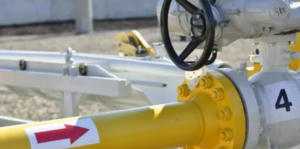
On October 24, the National Energy Regulatory Agency of Moldova (ANRE) held an open meeting of the Board of Directors, during which it approved a 50% reduction in tariffs for gas transportation to Ukraine.
“During the meeting, the Board approved amendments to Decision No. 272/2025 on the optimization of the ”Route 1″ capacity product on the Trans-Balkan pipeline, following a joint initiative submitted by natural gas transmission system operators from Greece, Bulgaria, Romania, the Republic of Moldova, and Ukraine. The initiative aims to strengthen regional energy security and ensure natural gas supplies to Ukraine,“ according to a statement on the ANRE official website.
”The approved changes provide for the extension of the application of the “Route 1” product for 6 months (November 2025 – April 2026), the application of a 50% reduction in transportation tariffs for SRL “Vestmoldtransgaz” at the Kaushen and Grebeniki interconnection points, as well as the extension of the application of the capacity product to all relevant interconnection points along the route. The application of a 50% reduction in transportation tariffs is also provided for by the Romanian transmission system operator SA “Transgaz,” ANRE explained.
“With this decision, the Republic of Moldova is strengthening its role as a regional transit corridor, facilitating the transport of natural gas from Greece to Ukraine and contributing to the diversification of routes and sources of supply. In the long term, transportation volumes are expected to increase and, as a result, the associated tariffs will decrease for users of the transport system operated by SRL Vestmoldtransgaz,” the statement emphasized.
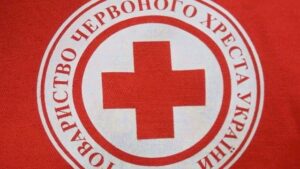
The Ukrainian Red Cross (URC) and the State Emergency Service of Ukraine conducted joint exercises in the Rivne region, the URC reported on Facebook on Saturday.
“Our cooperation with the State Emergency Service of Ukraine is an example of unity that saves lives. We are developing joint training platforms, strengthening the capacity of communities, and helping those who are the first to respond to emergencies. Today, the Ukrainian Red Cross is integrated into the territorial subsystems of the Unified State Civil Protection System in 20 regions. We have become part of the state response mechanism and plan to complete integration at the regional level by May 2026,” said Maxim Dotsenko, Director General of the Ukrainian Red Cross, at the opening of the exercises.
According to Vladimir Demchuk, Deputy Chairman of the State Emergency Service of Ukraine, such exercises are not only a training of technical skills, but also a rehearsal of interaction between structures that act as a single team at a critical moment.
“We are grateful to the Ukrainian Red Cross for its support, equipment, training opportunities, and constant readiness to help,” Demchuk said.
During the exercises, rescuers and volunteers from the Ukrainian Red Cross rapid response teams from five regions practiced coordinating their response to emergencies.
Participants worked at four locations, practicing rescue operations for victims trapped under rubble, responding to the consequences of chemical and radiation incidents, extinguishing fires during road accidents, and decontaminating victims at a decontamination station.
In addition, the Ukrainian Red Cross and the State Emergency Service of Ukraine signed an agreement on the joint use of the State Emergency Service of Ukraine’s training ground in the Rivne region.
As part of the event, the Main Directorate of the State Emergency Service of Ukraine in the Rivne region received a modular house, which will serve as a space for training and coordinating actions during exercises. In addition, 95 sets of firefighting equipment were transferred to volunteer firefighting teams in the territorial communities of the Rivne region.
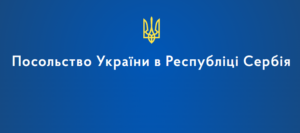
The Ukrainian children’s art festival “Veselka” was held in Novi Sad, Serbia, organized with the participation of the Ukrainian Embassy and the Ukrainian diaspora. The event became a platform for cultural unity and support for Ukrainian families living in Serbia.
The Veselka festival brought together children and families of Ukrainian origin from different cities in Serbia, offering them master classes, concerts, and interactive zones. The aim of the event was to preserve ties with Ukrainian roots, support the emotional well-being of migrant children, and strengthen the cultural infrastructure of the diaspora.
Exact data on the number of Ukrainian citizens and residents in Serbia varies. According to the Serbian Ministry of Internal Affairs, approximately 22,000 Ukrainian citizens have been registered in the country since the start of the war.
However, statistics on the number of Ukrainians living permanently or under temporary protection are not published regularly.

A report by Microsoft showed that in the first half of 2025, Ukraine ranked fifth in the world and third in Europe among the countries that were most often targeted by cyber activity. In particular, almost one in ten victims in Europe were from Ukraine (9.5%).
“Despite enormous challenges, Ukraine is rapidly transforming and becoming a leader in cybersecurity. By accelerating the adoption of cloud technologies, applying AI to protect critical infrastructure, and stimulating innovation, the country is building digital resilience,” said Renate Strazdin, Microsoft’s technology director for the Northern Europe Multi-country Cluster (NTO Europe North Multi-country Cluster).
The report notes that more than 52% of cyberattacks with known motives are due to extortion and ransomware, while cyber espionage accounts for only 4%. In 80% of cases, the attackers’ goal is to steal data, which underscores the global nature of this threat.
The company notes that every day it processes more than 100 trillion security system signals, blocks approximately 4.5 million new attempts by malicious software to attack, analyzes 38 million cases of risk detection for user accounts, and scans 5 billion emails for malware and phishing threats.
Microsoft noted in the report that hospitals, schools, and local governments are increasingly becoming targets of cyberattacks due to their storage of confidential data and limited resources for cyber defense. This leads to delays in medical care, interruptions in the educational process, and shutdowns of transportation systems.
The Microsoft Digital Defense Report 2025 also adds that outdated security measures are ineffective today. Therefore, the use of multi-factor authentication (MFA), which is particularly resistant to phishing, can prevent more than 99% of attacks involving credential theft.
The report separately notes that the threat from state actors remains. In particular, Russia is expanding its attacks beyond Ukraine, for example, to small businesses in NATO countries, using them as entry points into larger organizations. China is expanding its attacks on various industries and non-governmental organizations, using vulnerable devices for covert access.
Microsoft added that Iran is attacking logistics companies in Europe and the Persian Gulf, likely in preparation for disrupting commercial shipping, while North Korea is focusing on financial gain and espionage, in particular by employing IT specialists abroad who transfer their earnings to the regime.
The report notes that artificial intelligence (AI) is accelerating the development of threats. For example, cybercriminals use AI to automate phishing and create artificially generated content. Cybersecurity specialists, on the other hand, use it to better identify threats and improve user security.
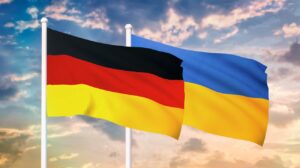
The Kiel Institute for the World Economy reported on Tuesday that military aid to Ukraine fell by 43% in July and August compared with the first half of the year.
According to the institute, most military support now flows through the Prioritized Ukraine Requirements List (PURL) program. That consists of NATO allies from Belgium, Canada, Denmark, Germany, Latvia, the Netherlands, Norway and Sweden.
The PURL initiative replaced U.S. arms donations to Ukraine and now requires allies to pay for U.S. weapons deliveries.
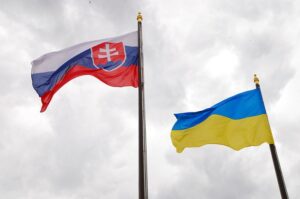
Ukraine and the Slovak Republic have signed an agreement on technical and financial cooperation and a joint roadmap.
On the Ukrainian side, the agreement was signed by Deputy Prime Minister for European and Euro-Atlantic Integration Taras Kachka following joint Ukrainian-Slovak intergovernmental consultations on Friday.
The countries also signed a protocol between the governments on border crossing points across the common state border. On the Ukrainian side, the document was signed by Deputy Prime Minister for the Restoration of Ukraine – Minister of Community and
Territorial Development Oleksiy Kuleba.
In addition, an agreement was signed between the countries on mutual understanding regarding the placement of Ukraine’s diplomatic mission in Slovakia and Slovakia’s diplomatic mission in Ukraine. On the Ukrainian side, the document was signed by Minister of Foreign Affairs Andriy Sibiga.
Prime Minister of Ukraine Yulia Sviridenko and Prime Minister of the Slovak Republic Robert Fico signed an agreement on the exchange of information on labor mobility, as well as a joint roadmap.
As reported, joint Ukrainian-Slovak intergovernmental consultations are taking place on Friday with the participation of Ukrainian Prime Minister Yulia Sviridenko and Slovak Prime Minister Robert Fico.